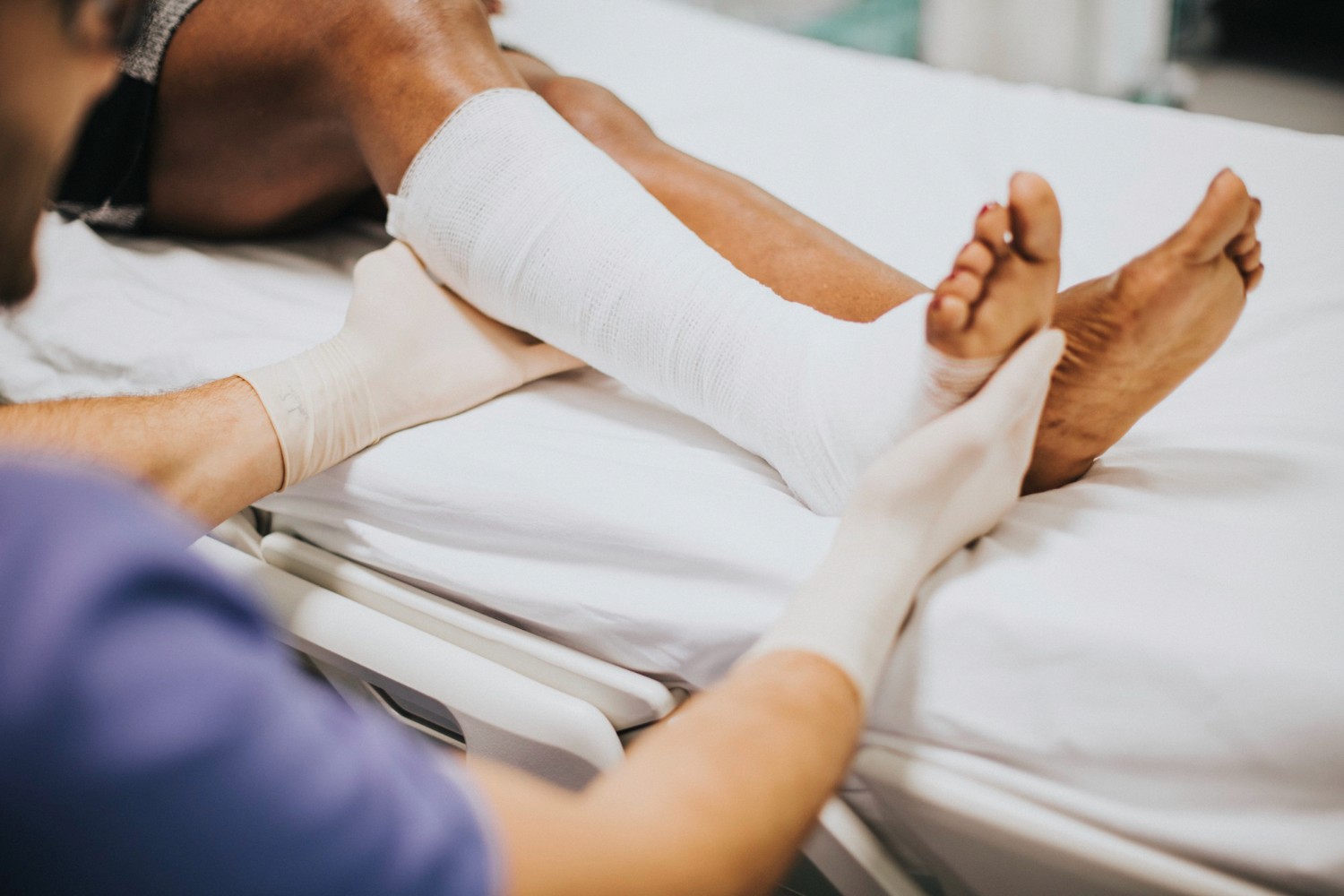
Personal Injury Law
Property law governs the ownership, transfer, and use of both movable and immovable property.
Personal Injury Law Overview:
Personal injury law covers situations where a person suffers physical, emotional, or psychological harm due to the actions or negligence of another person, company, or entity. In India, personal injury claims often arise from road accidents, workplace injuries, medical malpractice, or public liability incidents. Victims of personal injury are entitled to compensation for the harm they have suffered, including medical expenses, loss of income, emotional distress, and other damages.
Personal injury cases in India are governed by various statutes, like The Motor Vehicles Act, 1988, The Workmen’s Compensation Act, 1923, The Consumer Protection Act, 2019 (for medical negligence), The Fatal Accidents Act, 1855, Indian Penal Code (IPC) provisions related to causing hurt or death due to negligence
Types of Personal Injury Cases:
Road Accident Claims:
Road accidents are one of the most common causes of personal injury in India. Under the Motor Vehicles Act, 1988, victims of road accidents are entitled to compensation if they are injured due to another driver's negligence. This includes compensation for medical expenses, loss of income, and any permanent disability.
The Motor Accident Claims Tribunal (MACT) handles such cases and determines the compensation based on factors like the severity of the injury, medical bills, and the financial impact on the victim.
Our Lawyers assist victims of road accidents by filing claims with the Motor Accident Claims Tribunal (MACT), helping gather crucial evidence like accident reports, medical records, and witness statements, and negotiating with insurance companies to secure fair compensation for medical expenses, loss of income, and pain and suffering. They also represent clients in court if a settlement cannot be reached.
Medical Negligence:
Medical negligence occurs when a healthcare provider fails to provide the appropriate standard of care, leading to injury or harm to the patient. Claims of medical negligence can be made under the Consumer Protection Act, 2019, as healthcare is considered a "service" under the Act. Victims can seek compensation for damages caused by wrong diagnoses, surgical errors, or improper treatment.
In medical negligence cases, lawyers help victims prove that healthcare providers failed to provide the required standard of care. They file complaints under the Consumer Protection Act, 2019, gather expert medical opinions, and represent the victim in negotiations or court to seek compensation for medical expenses, emotional distress, and long-term harm caused by the negligence.
Workplace Injuries:
Workplace injuries, particularly in hazardous industries like construction or manufacturing, are governed by the Workmen’s Compensation Act, 1923. The law mandates employers to provide compensation to workers who suffer injuries in the course of employment. Injured workers can claim compensation for medical expenses, lost wages, and permanent disability.
Advocates assist employees injured at work by filing claims under the Workmen’s Compensation Act, 1923. They ensure that victims receive compensation for medical bills, lost wages, and, in severe cases, permanent disability. Lawyers help navigate employer disputes and represent victims in labour courts or tribunals when necessary.
Public Liability:
Personal injuries that occur in public places, such as slip-and-fall accidents or injuries caused by unsafe premises, may give rise to a claim under tort law. Owners or managers of public spaces have a duty to ensure the safety of visitors, and failure to do so can result in liability for any injuries sustained.
In cases of public liability, where individuals are injured due to unsafe conditions in public spaces, lawyers help establish the liability of property owners or public authorities. They file claims under tort law, negotiate settlements, or represent victims in court, ensuring they receive compensation for their injuries, including medical costs and any long-term damages.
Defamation and Emotional Distress:
Personal injury can also extend beyond physical harm to include emotional and psychological damage. Victims of defamation, harassment, or emotional trauma caused by someone else's actions may be entitled to compensation under tort law. Emotional distress claims are more challenging to prove but can be pursued in some cases.
Lawyers play a crucial role in defamation and emotional distress cases by helping victims file claims for reputational damage or psychological harm. They gather evidence of defamation or distress, file legal suits, and seek compensation for damages under civil tort law, protecting the victim’s dignity and financial interests.
Assault and Battery:
Assault and battery cases involve intentional harm caused by one person to another. In such cases, the victim can file a criminal complaint under the Indian Penal Code (IPC) and also pursue a civil claim for compensation.
Advocates in India assist victims of assault or battery by filing both civil and criminal cases. They work to ensure that the wrongdoer is punished under the Indian Penal Code (IPC) while also pursuing civil claims for compensation related to medical costs, lost income, and emotional trauma, ensuring justice and financial redress for the victim.
Compensation in Personal Injury Cases:
Compensation in personal injury cases is typically awarded based on the extent of the injury and its impact on the victim’s life. It can cover:
Medical Expenses: For treatment, hospitalisation, medication, and rehabilitation.
Loss of Income: For the time the victim is unable to work due to the injury.
Pain and Suffering: Compensation for physical pain and emotional distress caused by the injury.
Permanent Disability: If the injury results in permanent disability, the victim may be entitled to long-term compensation.
Loss of Consortium: In the case of wrongful death, the spouse or family members may claim compensation for the loss of companionship or support.
Our experienced lawyers maximise the compensation victims receive by evaluating the full scope of their injury, including medical bills, lost wages, and long-term effects like permanent disability or emotional trauma. They negotiate settlements or pursue court judgments to ensure the victim receives adequate compensation for all damages suffered
Legal Process in Personal Injury Cases:
Filing a Complaint: The victim must first file a claim with the relevant authority, such as the Motor Accident Claims Tribunal (MACT) for road accidents, or a consumer court for medical negligence. A complaint can also be filed under tort law for workplace or public liability injuries.
Gathering Evidence: The injured party must provide evidence of the injury, including medical records, accident reports, witness statements, and any other relevant documents to support their claim.
Negotiation: In many cases, the liable party (or their insurance company) may negotiate a settlement out of court to avoid a prolonged legal process. Lawyers help negotiate the terms of the settlement to ensure the victim receives fair compensation.
Trial: If a settlement cannot be reached, the case proceeds to trial, where both parties present their evidence. The court or tribunal determines the compensation amount based on the severity of the injury and its impact on the victim.
How Advocates/Lawyers Can Help in Personal Injury Cases:
Understanding Legal Rights: Lawyers help personal injury victims understand their legal rights and advise on the most appropriate course of action.
Navigating Complex Procedures: Advocates handle the complex legal procedures, paperwork, and deadlines associated with personal injury claims.
Maximising Compensation: Lawyers help victims maximise their compensation by ensuring that all aspects of their injury, including medical costs, loss of income, and pain and suffering, are considered in the claim.
Timely Resolution: Lawyers work to resolve personal injury cases as quickly as possible, negotiating settlements or speeding up court proceedings to get victims the compensation they deserve without unnecessary delays.
Protecting Clients' Interests: In cases where an insurance company is involved, lawyers ensure that their clients' interests are protected and that they are not coerced into accepting unfair settlements.
Personal injury law in India provides victims with the legal mechanisms to seek compensation for harm suffered due to another’s negligence or wrongdoing. Whether it’s a road accident, workplace injury, or medical malpractice, skilled advocates can guide clients through the legal process, negotiate settlements, and represent them in court to ensure justice is served.
Get expert help
A reader will be distracted by the way readable content of a page when looking at its layout.
How can consultation benefit my business?
What industries do you specialize in?
How do you ensure confidentiality?
What services do you offer?
Get expert help
A reader will be distracted by the way readable content of a page when looking at its layout.
Our customer review
Trusted by over 300,000 accounts and agencies
4.8
Score on TrustPilot



